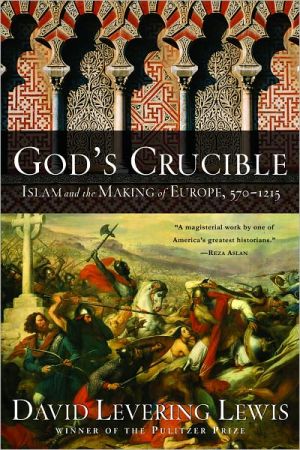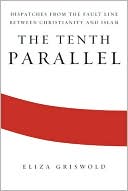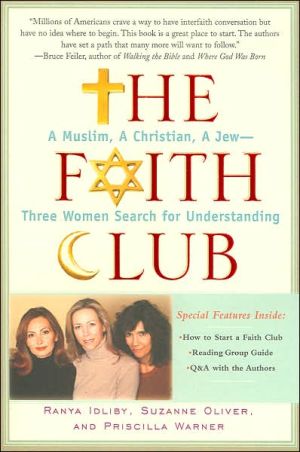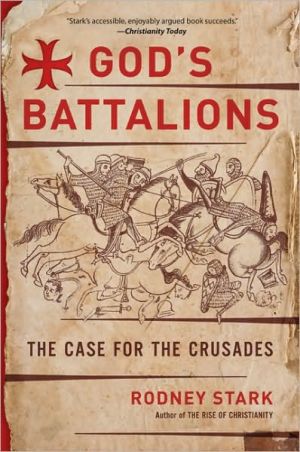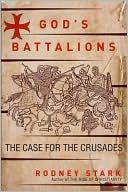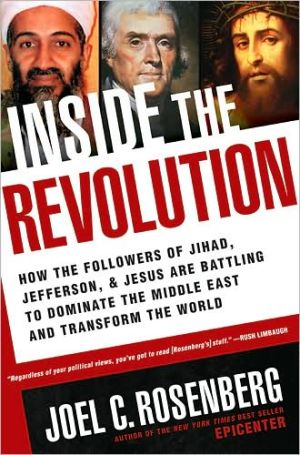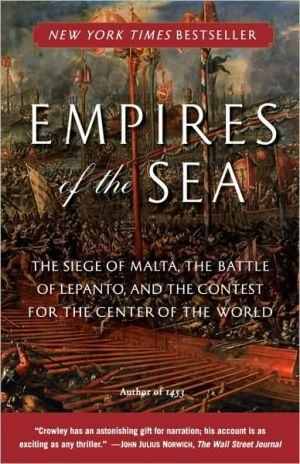God's Crucible: Islam and the Making of Europe, 570-1215
"A furiously complex age; a powerful narrative."—New York Times Book Review, Editor's Choice\ At the beginning of the eighth century, the Arabs brought a momentous revolution in power, religion, and culture to Dark Ages Europe. David Levering Lewis's masterful history begins with the fall of the Persian and Roman empires, followed by the rise of the prophet Muhammad and the creation of Muslim Spain. Five centuries of engagement between the Muslim imperium and an emerging Europe followed, from...
Search in google:
In this panoramic history of Islamic culture in early Europe, a Pulitzer Prizewinning historian reexamines what we once thought we knew. David Levering Lewis's narrative reveals how cosmopolitan, Muslim al-Andalus flourished—-a beacon of cooperation and tolerance between Islam, Judaism, and Christianity—-while proto-Europe made virtues out of hereditary aristocracy, religious intolerance, perpetual war, and slavery. The Barnes & Noble Review In the hundred years between the Prophet Muhammad's death in 632 and Charles the Hammer's victory over Muslim invaders at Poitiers in central France in 732, Islam conquered a huge swathe of the known world, erupting from what had been the historically irrelevant wastes of Arabia as far as central Asia in one direction and western Europe in the other.
List of Illustrations ixList of Maps xiChronology xiiiNotes on Usage xixPreface xxi1 The Superpowers 32 "The Arabs Are Coming!" 293 "Jihad!" 574 The Co-opted Caliphate and the Stumbling Jihad 855 The Year 711 1056 Picking Up the Pieces after Rome 1377 The Myth of Poitiers 1608 The Fall and Rise of the Umayyads 1849 Saving the Popes 20910 An Empire of Force and Faith 22411 Carolingian Jihads: Roncesvalles and Saxony 25112 The Great Mosque 26813 The First Europe, Briefly 28214 Equipoise - Delicate and Doomed 30415 Disequilibrium, Pelayo's Revenge 33316 Knowledge Transmitted, Rationalism Repudiated: Ibn Rushd and Musa ibn Maymun 367Acknowledgments 381Notes 385Glossary 423Genealogies 433Bibliography 439Credits 449Index 451
\ New York TimesIn God's Crucible, answers to many urgent questions, currently in the public discourse, can be deduced.— Eric Ormsby\ \ \ \ \ Washington PostLewis's treatment...is lucid, and his command of detail is encyclopedic....The book is erudite.— James B. Reston Jr.\ \ \ Eric Ormsby…fast-paced and provocative new study…[Lewis's] darting juxtapositions of dynasties and of cultures give a vivid sense of the furious complexities of the age. He describes the simmering state of tribal relations in the region as constituting "a flammable symbiosis," but the phrase has wider scope. To judge from his account, that symbiosis was more pervasive than we usually realize, and not merely flammable, but dangerously combustible.\ —The New York Times\ \ \ \ \ James Reston Jr.Lewis's treatment of Islam's explosive beginnings and its expansion across North Africa into Europe is lucid, and his command of detail is encyclopedic. His narrative is enriched by Arabic sources that are often ignored by European scholars…Lewis has made an important contribution to the growing body of literature on Muslim-Christian relations that has emerged after 9/11.\ —The Washington Post\ \ \ \ \ Publishers WeeklyThis superb portrayal by NYU history professor Lewis of the fraught half-millennium during which Islam and Christianity uneasily coexisted on the continent just beginning to be known as Europe displays the formidable scholarship and magisterial ability to synthesize vast quantities of material that won him Pulitzer Prizes for both volumes of W.E.B. Du Bois.\ In characteristically elegant prose, Lewis shows Islam arising in the power vacuum left by the death throes of the empires of newly Christianized Rome and Persian Iran, then sweeping out of the Middle East as a fighting religion, with jihad inspiring cultural pride in hitherto marginalized Arab tribes. After Charles Martel's victory at the Battle of Poitiers in 732 sent the Muslim invaders back south of the Pyrenees, the Umayyad dynasty consolidated its rule in al-Andalus (Muslim Spain), forging a religiously tolerant, intellectually sophisticated, socially diverse and economically dynamic culture whose achievements would eventually seed the Renaissance. Meanwhile, the virtually powerless Roman popes joined forces with ambitious Frankish leaders, from Pippin the Short to Charlemagne, to create the template for feudal Europe: a "religiously intolerant, intellectually impoverished, socially calcified, and economically primitive" society." The collapse of the Umayyad dynasty and the rise of local leaders who embraced Muslim fundamentalism as a means to power destroyed the vitality of al-Andalus, paving the way for the Crusades and the Christian reconquistaof Spain.\ Lewis clear-sightedly lays out the strengths and weaknesses of both worlds, though his sympathies are clearly with cosmopolitandoctor/philosophers like Ibn Rushd and Musa ibn Maymun (better known in the West as Averroës and Maimonides), who represented "cultural eclecticism and creedal forbearance," sadly out of place in the increasingly fanatical 12th century. 8 pages of color illus., 4 maps. (Jan.)\ Copyright 2007 Reed Business Information\ \ \ \ \ Library JournalWith an eye to modern headlines, Pulitzer-Prize winner Lewis (W.E.B. Du Bois) writes a cautionary tale of two civilizations that, rather than coexist, seemed bent on mutual destruction. He begins with a description of the political struggles between the Romans, later the Greco-Romans, and the Persians, a conflict that continued even after the forces of Islam conquered the Persians. Lewis traces both the rise of Islam and the West's recovery from the fall of Rome, explaining, for example, the internal power struggles of both East and West, and the differences between Shiite and Sunni. Using references perhaps chosen as familiar to U.S. readers, Lewis illustrates Islam's role in the evolution of European culture in the Middle Ages. The majority of the book deals with the period up to 960 C.E., with the last 40 pages discussing the 11th and 12th centuries. Lewis's convoluted writing style in this work, and his excessive use of anachronistic, extra-regional examples, such as Sherman's march through Georgia, make this book hard to recommend enthusiastically to scholars. Recommended for public libraries and some undergraduate libraries.\ —Robert Harbison\ \ \ \ \ \ Kirkus ReviewsCrowded yet sprightly account of Islam's definitive shaping of the world map during the so-called Dark Ages. While the Roman Empire was crumbling, writes Pulitzer Prize-winner Lewis (History/New York Univ.; W.E.B. Du Bois: The Fight for Equality and the American Century 1919-1963, 2000, etc.), Muhammad was taking up the sword for Allah. "The Arab jihad swept aside kingdoms and empires," he notes, achieving a tremendous revolution in power and culture in both Asia and fledgling Europe. Indeed, Lewis demonstrates beautifully, if the Franks under Charles Martel hadn't turned back the more enlightened Muslim invaders at Poitiers in 732, the continent might have been spared becoming "an economically retarded, balkanized, fratricidal Europe that, in defining itself in opposition to Islam, made virtues out of religious persecution, cultural particularism, and hereditary aristocracy." This thoughtful overview sheds welcome light on an increasingly relevant period of history. Avoiding the Eurocentric route, Lewis first traces the demise of the two superpowers, Graeco-Latin Rome and Persian Iran, grown exhausted through waging perpetual war on each other by the sixth century. Simultaneously, the self-proclaimed prophet Muhammad emerged from the proud, dominant Quraysh tribe of bustling Mecca to lead his people out of ignorance. He conquered Mecca with an army of believers before his death in 632, but it was his ardent followers who assembled the vital texts that would become the Qur'an and built a formidable military machine, sweeping over Syria, Persia, Egypt and the Maghreb. They crossed into Visigothic Iberia in 711, establishing a highly learned, tolerant culture that endured for 500 years.Lewis portrays a staggering number of personalities among the successive caliphs, as well as the righteous leaders of the marauding Lombards, Franks and Carolingians such as Clovis and Charlemagne. A work of clear-eyed scholarship-and occasionally challenging vocabulary.\ \ \ \ \ The Barnes & Noble ReviewIn the hundred years between the Prophet Muhammad's death in 632 and Charles the Hammer's victory over Muslim invaders at Poitiers in central France in 732, Islam conquered a huge swathe of the known world, erupting from what had been the historically irrelevant wastes of Arabia as far as central Asia in one direction and western Europe in the other. \ This epic event, and especially its consequences in Spain and beyond, is David Levering Lewis's subject. His account puts it into the setting of its sources, its early course, and especially its results. All of these he sees as contributing to the making of a not very attractive Europe -- a Europe of feudalism, hereditary aristocracy, religious strife, recurrent war, crusades and slavery -- defined by the necessity of opposing the Muslim threat from Andalusia while being shaped by the Muslims' preservation and transmission of classical antiquity through that same geographical region.\ Unlike most accounts of the rise and spread of Islam, including those that deal specifically with Muslim Spain, Lewis's book has the virtue of including an authoritative, wide-spectrum view of the circumstances that allowed Islam to spread in the first place, and an equally wide view of the later events in Western Christendom, especially in the Frankish realms and Papal Italy, that Lewis sees as key to the birth of Europe.\ He accordingly describes the titanic, long-running clash between the Roman and Persian empires that eventually weakened the first and destroyed the second, opening a large hole for Arab armies to race through, impelled to conquest by their new and energizing faith and the temptations of booty. The Muslim warriors found populations exhausted by war and divided by sectarian strife, and overran them easily. Riches and slaves poured into their hands, and with surprising rapidity they assimilated the lessons of the civilization they found in their vastly more developed new possessions.\ For Lewis, though, it is Spain and the effect of Muslim incursions into France that he finds most telling for his thesis that Europe was fashioned by reaction to Islam. He argues convincingly that it was not the battle of Poitiers in 732 that was most significant in stemming the advance of Islam into Europe, but the battle of Toulouse 11 years earlier. In that year, 721, Duke Odo of Aquitaine repelled the Muslim invaders under Amir al-Samh, and Lewis argues that if victory had gone the other way its momentum would have carried Islam northward and eastward to conquest of all the "Great Land," as Muslims called Europe, eventually reaching far enough eastward to complete the desired pincer movement upon Constantinople, which was every Caliph's dream.\ Lewis's thesis about an "economically retarded, balkanized, fratricidal" Europe as the product of reaction to the threat of Islamic invasion requires a contrast, in a picture of what Europe might have been if its resistance to Islam had not been successful. He provides it by arguing that if Islam had expanded beyond the Pyrenees, the scientific and cultural advances made by Europe from the 13th century onward could have been achieved three centuries earlier, and without the attendant feudal oppression and incessant strife, because it would have enjoyed the same tolerant, cultured, and advanced golden age that was ushered in by the Umayyad emirs and caliphs of C?rdoba.\ That is an interesting but debatable judgment. Lewis's own account of the ferocious civil strife that broke out among Muslims a mere 25 years after their Prophet's death, followed by permanent rifts and sectarianism, casts doubt upon the belief that the vaunted stability and religious tolerance of C?rdoba in its best period would have survived amid cooler climes and hotter heads.\ Moreover, his claim requires us to accept the rosy picture of a tolerant, interreligious, learned, and civilized Islam offering an example of a different possibility for Europe, as well as saving and embellishing the knowledge inherited from ancient Greece and Rome that actually helped Europe survive itself. The rosy view has become standard not just for C?rdoban Spain but for the best years of Islamic civilization in general, and there is no gainsaying much of it; the beauty of the art and architecture, the genius of poets and of the scholars who not only saved much ancient learning from oblivion but added to it, speaks for itself.\ But suppose we ask about other and different possibilities: for example, the survival and maturation of the Roman polity, the continued growth of classical civilization without irruption into it of either of those Oriental syncretisms of Christianity and Islam, and even the victory of Persia. Different Europes might have evolved from these roots. Or it might be -- as one is mainly disposed to think -- that the power of Europe's classical foundations survived both Christianity and the pressure of Islam on its borders, and is what really underwrites Europe and the world it conquered.\ Equally, we can compare the subsequent histories of European and Islamic civilization and ask what lay in the roots of each that made them turn out so differently. Islam's later history is one of decline and ossification, with numerous tendencies in it of reaction, fundamentalism, and oppression. Europe's history, including its expansion to other parts of the world, is by no means unalloyed with horrors of many kinds, but it is also a history of increasing economic and technological power. These facts deserve explanation, and it is only by stopping at the end of Muslim Spain's most glorious epoch that Lewis makes it seem surprising that the following years favored Europe rather than that Islamic glory.\ I hope Lewis might be moved to address this matter in a later book, because he writes with highly agreeable flair and narrative thrust, making important history into fascinating history, as the best should always be. More important, he has the breadth of vision for it, and perhaps the obligation too, having left us with a tantalizingly incomplete story. --A. C. Grayling\ A. C. Grayling is an author, playwright, reviewer, cultural journalist, and Professor of Philosophy at London University. The most recent of his many books are Towards the Light of Liberty and The Choice of Hercules. His play Grace is currently running Off-Broadway.\ \ \
